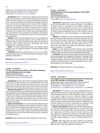 1 citations,
October 2022 in “Annual review of cell and developmental biology”
1 citations,
October 2022 in “Annual review of cell and developmental biology” The nervous system helps control stem cell behavior and immune responses, affecting tissue repair and maintenance.
 42 citations,
May 2016 in “Annual Review of Cell and Developmental Biology”
42 citations,
May 2016 in “Annual Review of Cell and Developmental Biology” Fat cells are important for tissue repair and stem cell support in various body parts.
7 citations,
May 1993 in “Journal of the European Academy of Dermatology and Venereology” Cell adhesion molecules are important in the development of certain skin diseases.
 April 2023 in “Journal of Investigative Dermatology”
April 2023 in “Journal of Investigative Dermatology” The research updated the skin cell profile, finding new skin cell markers and showing fibroblasts' key role in skin health.
56 citations,
July 2014 in “PloS one” SARMs may be an effective treatment for a certain type of breast cancer by blocking cancer growth and spread.
Current hair regeneration methods show promise but face challenges in maintaining cell effectiveness and creating the right environment for hair growth.
 37 citations,
July 2016 in “Current Opinion in Cell Biology”
37 citations,
July 2016 in “Current Opinion in Cell Biology” Live imaging has advanced our understanding of stem cell behavior and raised new research questions.
 141 citations,
August 2018 in “Nature Reviews Microbiology”
141 citations,
August 2018 in “Nature Reviews Microbiology” Some viruses can cause cancer by changing cell processes and avoiding the immune system; vaccines and targeted treatments help reduce these cancers.
 42 citations,
January 2017 in “Stem cells international”
42 citations,
January 2017 in “Stem cells international” Adding hyaluronic acid helps create larger artificial hair follicles in the lab.
 49 citations,
December 2009 in “Journal of Investigative Dermatology”
49 citations,
December 2009 in “Journal of Investigative Dermatology” Thyroid function affects skin health, with a complex interaction between the two.
 228 citations,
September 2012 in “Trends in Neurosciences”
228 citations,
September 2012 in “Trends in Neurosciences” Nerves are crucial for the regeneration of various body parts in many animals.
 September 2018 in “Cosmetics”
September 2018 in “Cosmetics” Inositol and arginine solutions improve hair follicle health and turnover.
 36 citations,
September 2009 in “Journal of Cellular and Molecular Medicine”
36 citations,
September 2009 in “Journal of Cellular and Molecular Medicine” New treatments targeting skin stem cells show promise for skin repair, anti-aging, and cancer therapy.
 61 citations,
September 2010 in “Genomics”
61 citations,
September 2010 in “Genomics” The study found that immune responses disrupt hair growth cycles, causing hair loss in alopecia areata.
 21 citations,
October 2009 in “Biochemical Engineering Journal”
21 citations,
October 2009 in “Biochemical Engineering Journal” Stem cell therapy is a promising approach for hair regrowth despite potential side effects.
 May 2020 in “Research Square (Research Square)”
May 2020 in “Research Square (Research Square)” Researchers found four key stages of cell development that are important for hair growth and shedding in cashmere goats.
 September 2011 in “Clinical Biochemistry”
September 2011 in “Clinical Biochemistry” The demineralized bone matrix scaffold is better for cell attachment than the mineralized bone allograft.
 139 citations,
August 2018 in “Development”
139 citations,
August 2018 in “Development” The niche environment controls stem cell behavior and plasticity, which is important for tissue health and repair.
 17 citations,
March 2021 in “Expert Opinion on Biological Therapy”
17 citations,
March 2021 in “Expert Opinion on Biological Therapy” Use PRP and ASC-BT for hair loss and wound healing, but more research needed.
 60 citations,
June 2019 in “Ageing Research Reviews”
60 citations,
June 2019 in “Ageing Research Reviews” Fat from the body can help improve hair growth and scars when used in skin treatments.
 2 citations,
March 2021 in “Journal of Cosmetic Dermatology”
2 citations,
March 2021 in “Journal of Cosmetic Dermatology” Umbilical cord-derived media is safe and effective for hair growth.
 438 citations,
October 2010 in “Oncogene”
438 citations,
October 2010 in “Oncogene” Keratins help protect cells, aid in cancer diagnosis, and influence cancer behavior and treatment.
100 citations,
November 2017 in “EMBO Reports” Metabolic signals and cell shape influence how cells develop and change.
 5 citations,
July 2022 in “Orphanet journal of rare diseases”
5 citations,
July 2022 in “Orphanet journal of rare diseases” RSPO1 mutations in certain patients lead to skin cells that don't develop properly and are more likely to become invasive, increasing the risk of skin cancer.
124 citations,
January 2012 in “Journal of Allergy and Clinical Immunology” Endocannabinoids help control mast cell activity in human skin.
42 citations,
December 2011 in “The journal of immunology/The Journal of immunology” RANKL causes lymph nodes to grow by making certain cells multiply.
 9 citations,
November 2021 in “Frontiers in Cell and Developmental Biology”
9 citations,
November 2021 in “Frontiers in Cell and Developmental Biology” PBX1 helps reduce aging and cell death in hair follicle stem cells by decreasing DNA damage, not by improving DNA repair.
 6 citations,
January 2015 in “Evidence-based Complementary and Alternative Medicine”
6 citations,
January 2015 in “Evidence-based Complementary and Alternative Medicine” Saw palmetto extract may help treat brain tumors by blocking a specific growth signal and blood vessel formation.
 1 citations,
December 2023 in “Scientific reports”
1 citations,
December 2023 in “Scientific reports” 3D microenvironments in microwells improve hair follicle stem cell behavior and hair regeneration.
 25 citations,
November 2014 in “Ageing Research Reviews”
25 citations,
November 2014 in “Ageing Research Reviews” Skin aging is caused by stem cell damage and can potentially be delayed with treatments like antioxidants and stem cell therapy.
























